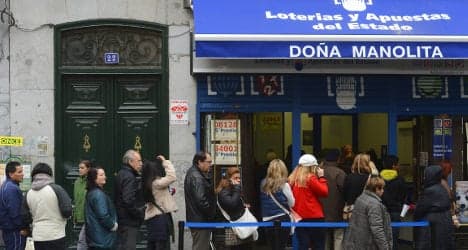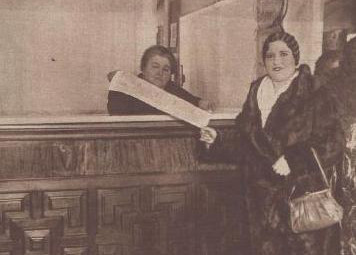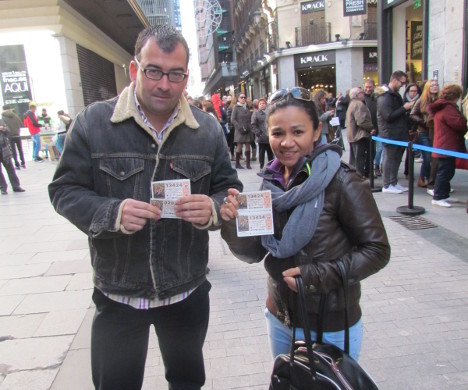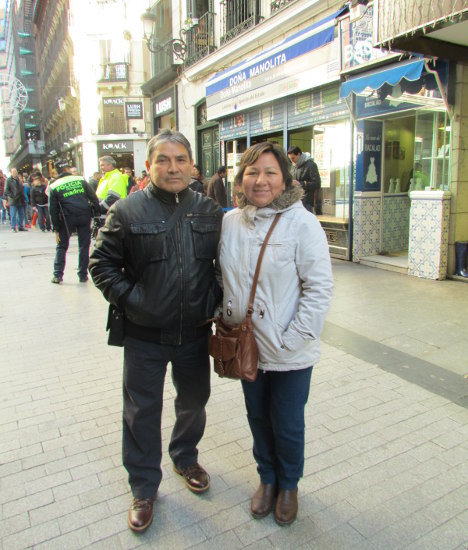Lifting the lid on Spain's Christmas lottery

If you're puzzled by all the long queues on streets around Spain in the lead-up to Christmas, then wonder no more. Welcome to Spain's unique 'El Gordo' (the Fat one) lottery, the richest in the world.
Every year at Christmas, Spaniards go lottery mad, queuing for hours to buy tickets for the famous Christmas lottery.
In 2014 prize money will total €2.2 billion ($2.74 billion), with the top individual prize, known as El Gordo (the Fat One), being €4 million.
With the odds of winning at least something put at one in six, no wonder the Christmas lottery has a whole nation gripped. According to Spanish newspaper, El Mundo, 75 percent of Spaniards play the Spanish Christmas lottery, spending a total of 0.3 percent of Spain’s GDP, or €3.2 billion.
History
El Gordo is a Spanish institution and the second oldest lottery in the world. The first Christmas lottery took place on 22nd December 1812 in Cádiz and the event has been taking place on the same day every year since.

Behind the counter is Doña Manolita, owner of one of the most famous lottery shops in Spain.
Not even the Spanish Civil War could stop the Christmas lottery, which moved to Valencia when the Republican government had to relocate their capital from Madrid.
After the war, the lottery moved back to Madrid and continued under the regime of the dictator Francisco Franco.
How it works
Because so many people in Spain take part in El Gordo, the ticketing system is complicated.
Unlike in the UK, for example, you don’t go into a newsagent and shade in the numbers you want on your lottery card. Instead, lottery shops have certain numbers available.
This is why the big winners of the Christmas Lottery are usually from the same area: many people have bought tickets from the same shop which holds all the winning tickets.
This assigning of numbers to certain shops means if you want to 'play' a particular number, you might have to travel quite a way — or buy your tickets online.
It's also possible to track down where to buy your preferred number using online search tools like this one from El País.
In terms of prizes, because so many people take part, numbers are repeated up to 160 times. That means if you do win El Gordo, you will be sharing your prize with at least 159 others. This explains why the top individual prize in the biggest lottery in the world comes in at a 'mere' €4 million.
One ticket (billete) costs a whopping €200, but many people choose to buy a tenth of a ticket (un décimo) for €20. Even smaller portions of tickets are sold: it is common for businesses to buy a ticket then sell small portions, or 'participaciones', of that ticket to their patrons for €1.
The Players
The Local went along to Doña Manolita, one of the most famous lottery ticket sellers in Madrid, to see how Christmas lottery fever is sweeping the country.
This little shop just off Madrid's Puerta de Sol shop was founded in 1904 by Manuela de Pablo, 'Doña Manolita', and quickly built a reputation for its big prizes. Manuela ran the business with her three sisters until it was eventually sold to another family in the eighties, but the reputation of the shop continues to this day, with people travelling from around the country to buy lottery tickets here.
You would expect Monday morning to be a relatively quiet time for lottery ticket sellers, but at Doña Manolita´s the queue stretched out the door, round the corner and down the street.

Frances and Jesús (pictured above) come to this same shop every year to buy their tickets because they believe the shop is lucky.
"We waited in line for two hours today but last year we waited six hours," they told The Local.
"We've come all the way from Castellón to buy these tickets, taken the train and everything," Jesús said, showing just how far many Spaniards will travel to get their lucky number or to buy tickets from a lucky shop. And maybe they are on to something: last year Frances and Jesús won €1,000.

Meanwhile, Eduardo and Ana (above) marked their visit to Doña Manolita’s with a photograph outside the famous shop.
They had been waiting for around an hour when The Local spoke to them.
"We always come to Doña Manolita's," they said. "People come from all over the country just to buy their lottery tickets from this shop."
Ana told The Local she would buy a flat if she won first prize, because she and Eduardo rent one at the moment. She would also like to invest some money towards a secure future.
Right at the back of the queue stood Maite, who thinks the popularity of El Gordo is down to "the hope and happiness it brings people in this time of economic crisis".
She pointed out that she doesn't believe in luck but plays because of "tradition: I’ll only buy one décimo today because I just buy a ticket out of tradition, it’s something everyone does here in Spain".
And if she won the €4-million jackpot? "I´d stop working and start living!"
The night itself
Every 22nd December the streets of Spain are silent as everyone huddles round their televisions to watch the El Gordo lottery draw, an affair which can take over three hours.
The balls are drawn in a unique way befitting the unique lottery tradition, while the numbers are sung by the pupils of Madrid's San Ildefonso school.
The school was originally for orphans and the tradition of the winners of El Gordo donating a portion of their winnings to San Ildefonso dates from this time.
The balls were originally only drawn by boys, with the first girl taking part in the big draw singalong in 1984. Audience members at the live draw, as well as viewers watching from home, are known to dress up in lottery-themed clothing and hats.
On the stage itself are two spherical vessels, one containing balls embossed with the numbers found on the lottery tickets and the other featuring the associated prizes in euros.
"Ball number 20.456 gets €20,000!” they might sing. This goes on, the tension rising until, at some point in the live broadcast, the €4-million ball is drawn making the numbered ball drawn alongside it El Gordo.
The winners
In 2011 the tiny Spanish village of Sodeto famously won El Gordo, with all but one of its 250 inhabitants having bought a lottery ticket. The unlucky loser was a Greek resident who lived on the edge of town and failed to buy a ticket because he did not realize just how big the Christmas lottery was.
The winners each claimed a share of €120 million, with people collecting sums ranging from €100,000 to €1 million each.
This was the first time in El Gordo’s 200 year history that one entire village had won the prize, but it is not uncommon for many people in the same location to all win at the same time, given lottery shops are often assigned the full complement of a given number.
The advert
Every year the Christmas lottery releases a suitably schmaltzy advert.
This year’s includes a heart-warming story of a man sharing the lottery prize with the local bar and has been generally well-received compared to last year’s ad which united five of Spain’s great singers, singing a song to the tune of ‘You were always on my mind’ set to lyrics all about the Christmas lottery. That commercial was mercilessly parodied on YouTube.
The controversy
Crisis-hit Spain taxed the lottery for the first time in 2013, with the Spanish government hitting the headlines for the 20 percent tax imposed on prizes over €2,500 in the much-loved lottery.
Spaniards love the lottery, but in 2013 the average amount spent on it was down: each Spaniard spent €49.98, according to data from the state lottery, 4.2 percent down on the previous year.
The Christmas lottery is also not immune to scams. Madrid's city council recently warned people to buy their tickets only from authorized vendors, and not to believe emails telling them they had won prizes.
Last but not least, the council warned people to keep their ticket safe as losing them makes claiming prizes very difficult indeed.
Comments
See Also
Every year at Christmas, Spaniards go lottery mad, queuing for hours to buy tickets for the famous Christmas lottery.
In 2014 prize money will total €2.2 billion ($2.74 billion), with the top individual prize, known as El Gordo (the Fat One), being €4 million.
With the odds of winning at least something put at one in six, no wonder the Christmas lottery has a whole nation gripped. According to Spanish newspaper, El Mundo, 75 percent of Spaniards play the Spanish Christmas lottery, spending a total of 0.3 percent of Spain’s GDP, or €3.2 billion.
History
El Gordo is a Spanish institution and the second oldest lottery in the world. The first Christmas lottery took place on 22nd December 1812 in Cádiz and the event has been taking place on the same day every year since.
Behind the counter is Doña Manolita, owner of one of the most famous lottery shops in Spain.
Not even the Spanish Civil War could stop the Christmas lottery, which moved to Valencia when the Republican government had to relocate their capital from Madrid.
After the war, the lottery moved back to Madrid and continued under the regime of the dictator Francisco Franco.
How it works
Because so many people in Spain take part in El Gordo, the ticketing system is complicated.
Unlike in the UK, for example, you don’t go into a newsagent and shade in the numbers you want on your lottery card. Instead, lottery shops have certain numbers available.
This is why the big winners of the Christmas Lottery are usually from the same area: many people have bought tickets from the same shop which holds all the winning tickets.
This assigning of numbers to certain shops means if you want to 'play' a particular number, you might have to travel quite a way — or buy your tickets online.
It's also possible to track down where to buy your preferred number using online search tools like this one from El País.
In terms of prizes, because so many people take part, numbers are repeated up to 160 times. That means if you do win El Gordo, you will be sharing your prize with at least 159 others. This explains why the top individual prize in the biggest lottery in the world comes in at a 'mere' €4 million.
One ticket (billete) costs a whopping €200, but many people choose to buy a tenth of a ticket (un décimo) for €20. Even smaller portions of tickets are sold: it is common for businesses to buy a ticket then sell small portions, or 'participaciones', of that ticket to their patrons for €1.
The Players
The Local went along to Doña Manolita, one of the most famous lottery ticket sellers in Madrid, to see how Christmas lottery fever is sweeping the country.
This little shop just off Madrid's Puerta de Sol shop was founded in 1904 by Manuela de Pablo, 'Doña Manolita', and quickly built a reputation for its big prizes. Manuela ran the business with her three sisters until it was eventually sold to another family in the eighties, but the reputation of the shop continues to this day, with people travelling from around the country to buy lottery tickets here.
You would expect Monday morning to be a relatively quiet time for lottery ticket sellers, but at Doña Manolita´s the queue stretched out the door, round the corner and down the street.
Frances and Jesús (pictured above) come to this same shop every year to buy their tickets because they believe the shop is lucky.
"We waited in line for two hours today but last year we waited six hours," they told The Local.
"We've come all the way from Castellón to buy these tickets, taken the train and everything," Jesús said, showing just how far many Spaniards will travel to get their lucky number or to buy tickets from a lucky shop. And maybe they are on to something: last year Frances and Jesús won €1,000.
Meanwhile, Eduardo and Ana (above) marked their visit to Doña Manolita’s with a photograph outside the famous shop.
They had been waiting for around an hour when The Local spoke to them.
"We always come to Doña Manolita's," they said. "People come from all over the country just to buy their lottery tickets from this shop."
Ana told The Local she would buy a flat if she won first prize, because she and Eduardo rent one at the moment. She would also like to invest some money towards a secure future.
Right at the back of the queue stood Maite, who thinks the popularity of El Gordo is down to "the hope and happiness it brings people in this time of economic crisis".
She pointed out that she doesn't believe in luck but plays because of "tradition: I’ll only buy one décimo today because I just buy a ticket out of tradition, it’s something everyone does here in Spain".
And if she won the €4-million jackpot? "I´d stop working and start living!"
The night itself
Every 22nd December the streets of Spain are silent as everyone huddles round their televisions to watch the El Gordo lottery draw, an affair which can take over three hours.
The balls are drawn in a unique way befitting the unique lottery tradition, while the numbers are sung by the pupils of Madrid's San Ildefonso school.
The school was originally for orphans and the tradition of the winners of El Gordo donating a portion of their winnings to San Ildefonso dates from this time.
The balls were originally only drawn by boys, with the first girl taking part in the big draw singalong in 1984. Audience members at the live draw, as well as viewers watching from home, are known to dress up in lottery-themed clothing and hats.
On the stage itself are two spherical vessels, one containing balls embossed with the numbers found on the lottery tickets and the other featuring the associated prizes in euros.
"Ball number 20.456 gets €20,000!” they might sing. This goes on, the tension rising until, at some point in the live broadcast, the €4-million ball is drawn making the numbered ball drawn alongside it El Gordo.
The winners
In 2011 the tiny Spanish village of Sodeto famously won El Gordo, with all but one of its 250 inhabitants having bought a lottery ticket. The unlucky loser was a Greek resident who lived on the edge of town and failed to buy a ticket because he did not realize just how big the Christmas lottery was.
The winners each claimed a share of €120 million, with people collecting sums ranging from €100,000 to €1 million each.
This was the first time in El Gordo’s 200 year history that one entire village had won the prize, but it is not uncommon for many people in the same location to all win at the same time, given lottery shops are often assigned the full complement of a given number.
The advert
Every year the Christmas lottery releases a suitably schmaltzy advert.
This year’s includes a heart-warming story of a man sharing the lottery prize with the local bar and has been generally well-received compared to last year’s ad which united five of Spain’s great singers, singing a song to the tune of ‘You were always on my mind’ set to lyrics all about the Christmas lottery. That commercial was mercilessly parodied on YouTube.
The controversy
Crisis-hit Spain taxed the lottery for the first time in 2013, with the Spanish government hitting the headlines for the 20 percent tax imposed on prizes over €2,500 in the much-loved lottery.
Spaniards love the lottery, but in 2013 the average amount spent on it was down: each Spaniard spent €49.98, according to data from the state lottery, 4.2 percent down on the previous year.
The Christmas lottery is also not immune to scams. Madrid's city council recently warned people to buy their tickets only from authorized vendors, and not to believe emails telling them they had won prizes.
Last but not least, the council warned people to keep their ticket safe as losing them makes claiming prizes very difficult indeed.
Join the conversation in our comments section below. Share your own views and experience and if you have a question or suggestion for our journalists then email us at [email protected].
Please keep comments civil, constructive and on topic – and make sure to read our terms of use before getting involved.
Please log in here to leave a comment.